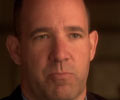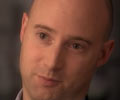- People
- Matthew Dowd
- Matt Bai
- Ron Brownstein
- Bradford Berenson
- Newt Gingrich
- Newton Minow
- David Keene
- Sidney Blumenthal
- Related Link
- Change We Really Believe In?
An essay by Paul Stekler, co-producer and co-writer of The Choice 2008
Matthew Dowd Political consultant; co-author, Applebee's America; chief strategist, Bush re-election campaign

I think the choice becomes two things. The choice becomes, are we ready to turn the mantle, like John F. Kennedy, over to a new generation of leaders? And that's going to basically be composed for the next 10, 15, 20 years. … Or do we want sort of a placeholder that we know, somebody seasoned, will hold the office, but we're not ready to sort of move to full fundamental change in our politics? …
The other thing is, do people perceive John McCain as any real change from President Bush? Or is this just another Republican in the line of President Bush?
Barack Obama they're going to see as change. But is he the right vessel of change? Can they accept a young, African American with limited political experience to be that change candidate? …
Matt Bai The New York Times Magazine; author, The Argument

There are a couple things happening at the end of the 20th century that lead us into this campaign and they're quite profound. They're not the kind of things that are always happening in American politics.
One is this incredible sense that politics isn't working -- that traditional, binary, two-party politics, led by baby boomer-era politicians, having this same fight they've been having for decades over the same issues and the same language with the same non-result, is not getting the country where it needs to go; that we are facing … transformative challenges that are different than we've had in the decades before; that our economic and our foreign policy challenge is different. People feel the change in their lives … and they understand that Washington isn't coming to terms with it as quickly as we need to.
And so there is this desire to change the template of politics. It's a transitional moment. And both of these guys emerge … McCain and Obama. You can say that McCain went back and made himself palatable to the Republicans, and that's true. You can say that Obama is, in his voting record, a traditional liberal, and that's true.
But both of them in what they convey to voters -- one in a long career, spanning decades; the other in a lightning-flash of a career, spanning what seems like minutes -- both of them convey to voters a sense of breaking with the status quo, a sense of change, a sense that things need to be done differently than they've [been] done before.
And the question I think a lot of voters will have to ask themselves is who's actually going to deliver? It may be, for a lot of voters, less about one i